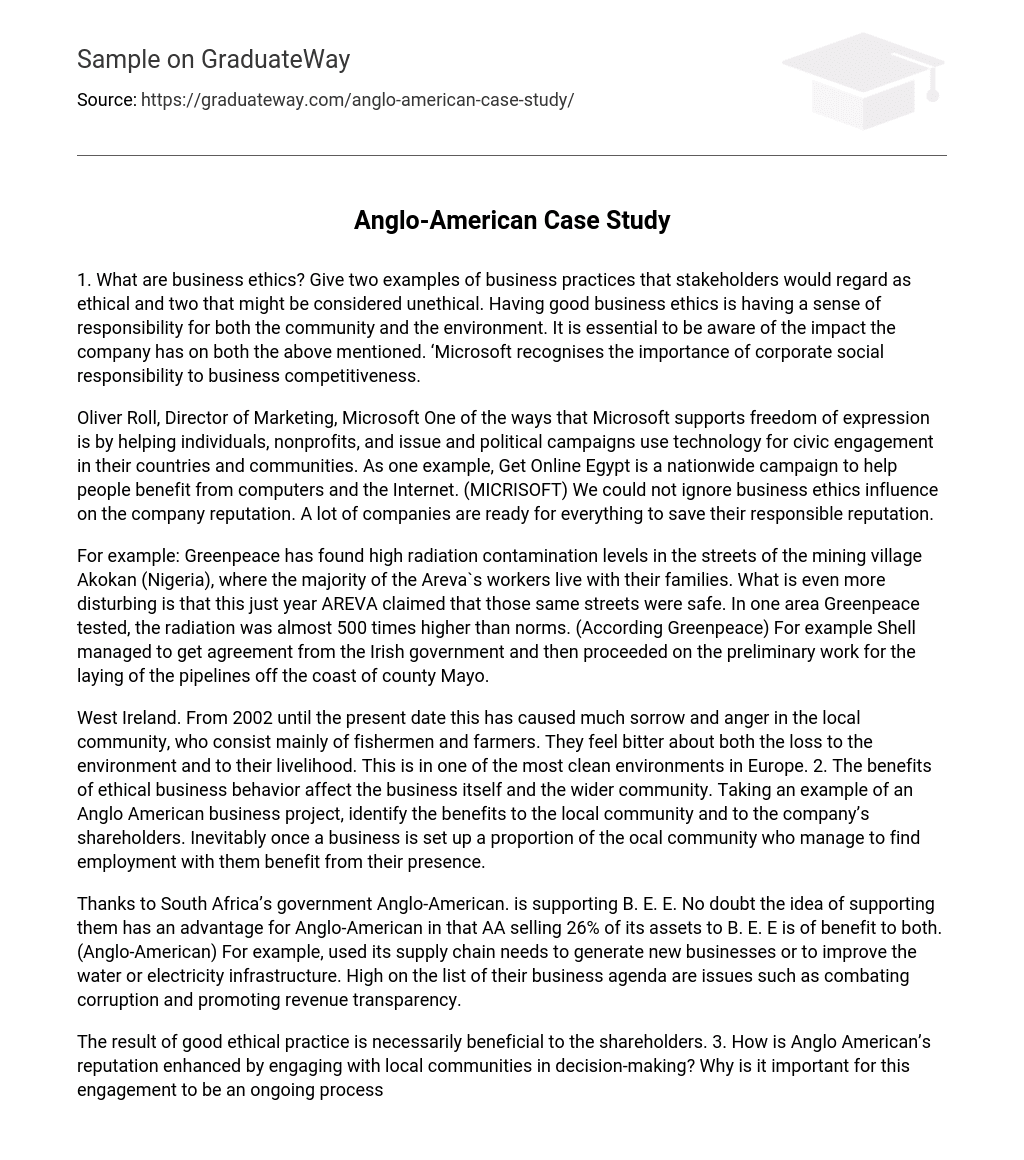Business ethics refers to the codes and principles that guide ethical behavior in business organizations. Stakeholders believe that certain business practices are ethical, while others are considered unethical. Two examples of ethical business practices include demonstrating a sense of responsibility towards the community and the environment. Conversely, engaging in unethical business practices can harm both the community and the environment. Microsoft acknowledges that corporate social responsibility is crucial for maintaining business competitiveness.
Oliver Roll, Director of Marketing at Microsoft, explains that Microsoft promotes freedom of expression by assisting individuals, nonprofits, and various campaigns in using technology for civic engagement. An instance of this is the nationwide campaign called Get Online Egypt, which aims to empower citizens through computers and the Internet. (MICRISOFT) Additionally, the importance of business ethics in preserving a positive company reputation cannot be overlooked, as many companies prioritize maintaining their responsible image.
Greenpeace has discovered elevated levels of radiation contamination in the streets of Akokan, a mining village in Nigeria where the majority of Areva’s employees reside with their families. This situation is particularly alarming given that Areva had previously declared these streets to be safe. Results from Greenpeace’s tests revealed that in one specific area, the radiation levels were nearly 500 times higher than the established norms. Additionally, according to Greenpeace, Shell managed to secure approval from the Irish government and has now commenced initial work for the installation of pipelines off the coast of county Mayo.
Since 2002, the local community in West Ireland, comprised mainly of fishermen and farmers, has been experiencing significant sorrow and anger. This is a result of the detrimental impact on both their livelihoods and the environment. It is important to note that this region is well-known for having one of Europe’s cleanest environments. Furthermore, practicing ethical business conduct brings benefits to both companies and the wider community. For example, when analyzing a project conducted by Anglo American business, it becomes clear that advantages exist for both the local community and the company’s shareholders. Once a business is established, a portion of the local community can benefit from employment opportunities it provides.
Anglo-American, thanks to the South African government, is supporting B.E.E. Undoubtedly, supporting them has advantages for Anglo-American. The sale of 26% of its assets to B.E.E. benefits both parties. Anglo-American utilizes its supply chain needs to create new businesses and enhance water or electricity infrastructure. Combatting corruption and promoting revenue transparency are high priority on their business agenda.
Engaging with local communities in decision-making is crucial for enhancing Anglo American’s reputation. This ongoing process is important as it ensures the survival of the company in the long term. By involving the local community, both the company and the community benefit from a give and take exchange, ultimately achieving a balanced relationship.
Since the Rio ecological world summit in 1992, we have been aware of the limited supply of the world’s resources. Anglo American has established an international best practice by providing automatic consultation and fair compensation for re-location needs. Two villages in South Africa, after several years of negotiation, have successfully been relocated to better homes with more land. Without this negotiation, Anglo American would not have been able to gain access to valuable mineral deposits.
Anglo American demonstrates the achievement of a careful balance between social, economic, and environmental factors in its business decisions. The case study provides examples of this balance. The importance of sustainable business practices is emphasized, as many individuals have previously prioritized short-term thinking without contemplating the consequences of their environmental impact. It is acknowledged that incorporating environmental and community concerns is essential for the longevity of the business.
The company’s success leads to more job opportunities, benefiting the local community. It is equally important to ensure good working conditions and fair practices for employees. About 25% of Anglo-American business in South Africa supports the B.E.E group, which aims to economically empower black individuals. Moreover, the company aims to have at least 40% of its managerial positions filled by individuals from previously disadvantaged ethnic groups.
The Anglo-American company, which supports the principles stated in the Universal Declaration of Human Rights, has been consulting with the local community for several years. As part of their efforts, they have constructed new villages at Motlhotlo that offer improved housing, infrastructure, and additional farming land. The relocation program at Motlhotlo is currently underway. In contrast, at Ga Pila, nearly all (98%) of the residents in the old village willingly accepted the company’s offer and relocated to the new village.





